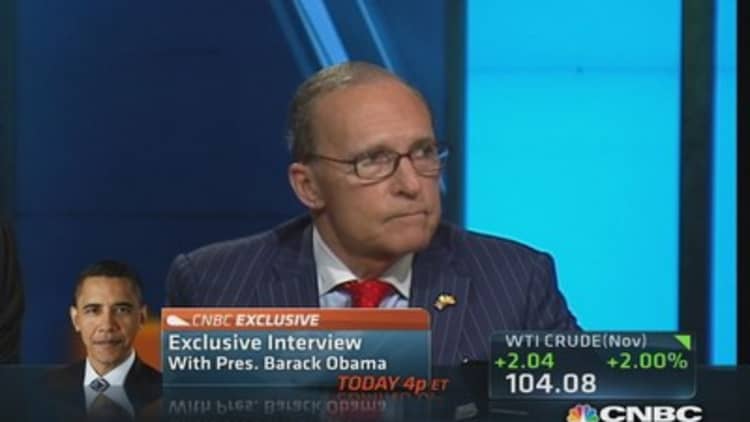Google News reports "about 79,000,000 results" for the term "government shutdown," and everyone on both sides of the aisle seems to agree that what's happening right now is a government shutdown. But there is nothing in federal law referring to a government shutdown. And the ubiquitous use of the phrase to refer to what's happening in Washington right now is lazy and sensational.
The term seems to have first been used in late 1980 with the Civiletti Opinion, in which then-Attorney General Benjamin Civiletti interpreted the Antideficiency Act to mean that without a spending bill, government work could not continue. He followed that up with a second opinion decreeing that essential government services could continue without such a bill—which is at odds with any definition of the word "shutdown" in any context other than this.
(Read more: 143-year-old law puts fear in officials during shutdown)
It wasn't until 1995 that a government shutdown lasting more than three days happened, and the phrase "government shutdown" hadn't even appeared in a law journal until 1994. But by 1995, the terminology had become so widespread that a memorandum prepared by the Attorney General's Office of Legal Counsel chief Walter Dellinger ripped into it in unusually strong terms (for an intergovernmental memorandum):
[P]rior responses to the threat of or actual lapsed appropriations have been so commonly referred to as cases of "shutting down the government" that this has become a nearly universal shorthand to describe the effect of a lapse in appropriations. It will assist in understanding the true extent of the Act's requirements to realize that this is an entirely inaccurate description.
An actual government shutdown, the memo notes, would "produc[e] incalculable amounts of suffering and loss."

Doug Holtz-Eakin, the former director of the Congressional Budget Office, said he has "no idea" where the term comes from, and says that, in practice, so-called government shutdowns are "more embarrassing than dangerous."
But he has a theory.
"We do have private sector entities that shut down," he said. "The factory's gate closes for the last time and the worker picks up his lunch pail and walks off into the sunset. At some point, some good messaging person figured out that that was the way to frame [lapses in appropriations]. Getting to the emotional core of something is very powerful. That's where this comes from."
(Read more: Shutdown may last week; budget talks possible: Boehner aide)
Clearly we need a new term; Dellinger's "lapse in appropriations" is accurate; Holtz-Eakin suggested "funding gap." But neither of those is especially catchy.
So I called Charles Tiefer, a University of Baltimore law professor and former deputy general counsel for the U.S. House of Representatives. After he noted that "government shutdown" overstates the impact of what's happening, I asked him to come up with a better term.
"That's a new one. No one's ever asked me that," he said. "Do you mind just sitting here while I try to think?"
After a minute or so of silence and professorial grumbling, he was talking again.
"Well, you could say the government goes into a coma. Its vital signs are maintained but it ceases most of its activity."
Fiscal coma? A little creepy, perhaps—but more accurate than "government shutdown."
—By Zac Bissonnette, for CNBC.com. Bissonnette's book "Good Advice From Bad People: Selected Wisdom From Murderers, Stock Swindlers, and Lance Armstrong" will be published in March by Penguin.


